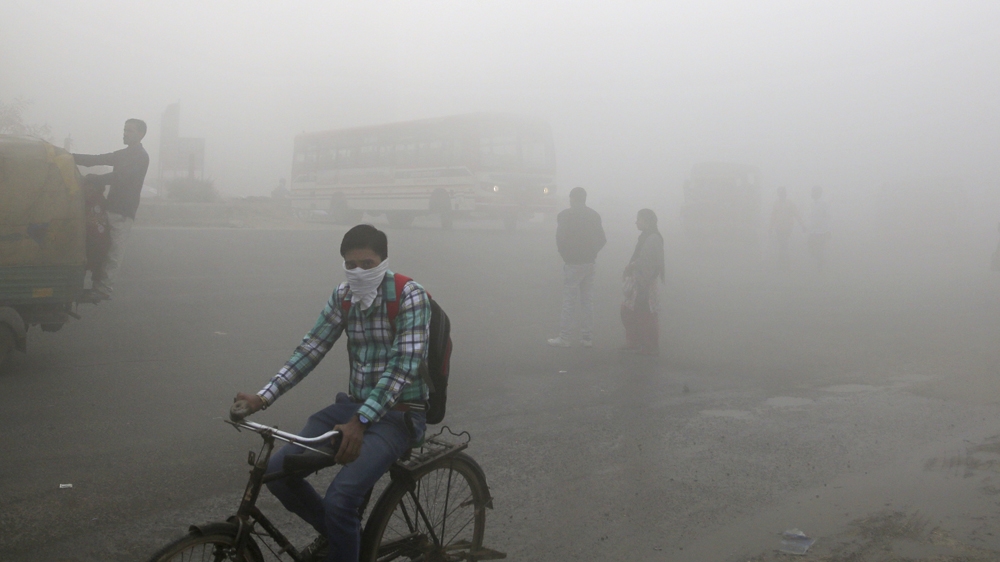Wealthy nations invoke their power to secure supplies at the expense of developing countries, an imbalance the World Health Organisation is desperately trying to rectify.
Prashant Saxena, head of pulmonology and critical care at Delhi’s posh Max hospital in south Delhi’s Saket, is a busy man.
“This smog is a silent killer. In the years to come, the severe effects of this polluted air in our bodies will reveal its deadly effects,” he told Al Jazeera.
He says there is a 20-25 percent increase in emergency patients and another 25 percent increase in the number of outpatients visiting him daily since a thick blanket of smog enveloped Delhi last week.
“The situation is uncontrollable and unmanageable for us. There is shortage of beds and even medicines and devices like nebulisers,” Saxena said.
The apex body of doctors in the country, Indian Medical Association (IMA), urged people to stay indoors as it declared a public health emergency in the wake of the worst pollution in years.
Delhi is the most polluted city in the world, and the burning of crops by farmers in the neighbouring states and industrial pollution has worsened the situation further.
PM2.5 levels rose to 703 on November 7, which was more than the double the 300 mark deemed as “hazardous”, forcing authorities to temporarily shut city schools.
Since then PM2.5, which has been linked to lung and heart diseases, has regularly remained above 500 this week.
Normal life disrupted
According to science journal The Lancet , about half a million Indians died prematurely in 2015 due to PM2.5 pollution.

[Thick blanket of smog engulfed New Delhi and its adjoining areas on November 7 (Altaf Qadri/Daylife)]
Patients have been lining up at government and private hospitals with ailments such as chronic obstructive lung diseases, asthma, chronic bronchitis, pneumonia, and nasal, eye and skin allergies.
The toxic smog has disrupted normal life northern India and parts of Pakistan, with flights cancelled and the number of people being reporting respiratory disease going up.
Outside Saxena’s chamber, patients swarm. It’s Ayodhya Prasad’s fourth visit in a row. He says he cannot breathe and is suffering serious respiratory problems owing to the smog.
The 55-year-old, who works as a laboratory assistant at the Indian Institute of Technology in New Delhi, is receiving nebuliser therapy at the hospital.
“I can’t breathe. I keep coughing and my eyes burn. I am an asthma patient. This pollution is making it unbearable. I can’t climb up the three flights of stairs to my home as I feel my lungs will give way,” Prasad told Al Jazeera.
A few kilometres away from this high-end hospital in a jhuggi (slum) in Valmiki Mohalla lives Rahul Singh. He is young but has the same respiratory ailment as Prasad. The 14-year-old is complaining of breathing problems and a chronic cough.
“My chest feels heavy, and I have to breathe with a lot of force. I feel tired all the time now,” Singh told Al Jazeera.
‘Pollution will kill me slowly’
He is running the risk of permanent lung damage as a study published by The New England Journal of Medicine shows.
His mother Divya, 40, is the sole bread-earner of the family. She works as a housemaid for families in an apartment block nearby, Gangotri Apartment.
“I feel guilty. I leave my son without anyone attending to him as I cannot miss work. The doctor says we should get an air filter in the house, I don’t have the money to buy such an expensive device,” Divya says, as she prepares lunch for her son.
The outpouring of anger has found space on social and print media, while news channels devoted hours of debate on the pressing issue.
But many members of the working class are resigned to their fate in the face of a political class which is engaged in blame-game.
At a middle-class apartment cluster at Alaknanda in South Delhi, 50-year-old, Radhey Shyam works as a guard.
His duty mandates him to stay outdoors the whole day in a city where the top doctors body, the IMA, advises everyone to stay indoors.
“It is difficult, but what will I eat if I don’t work? The pollution will kill me slowly but the hunger will do it faster,” he told Al Jazeera.